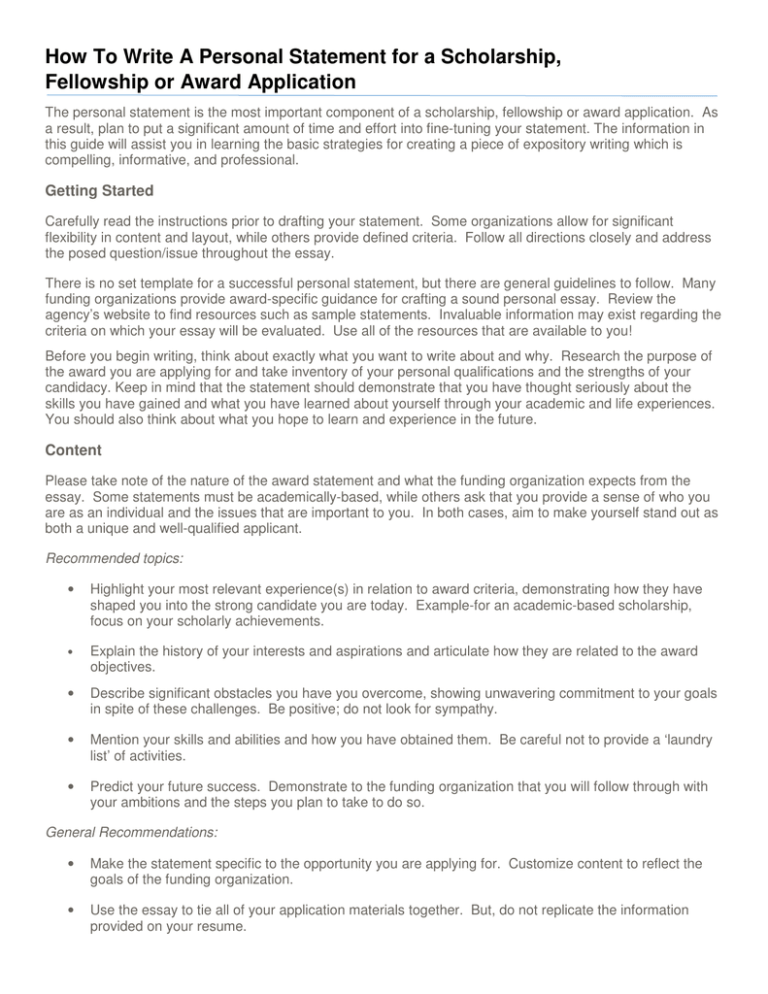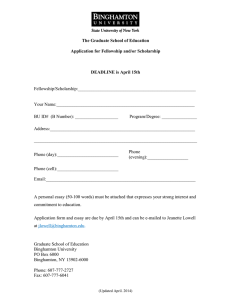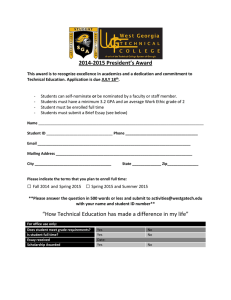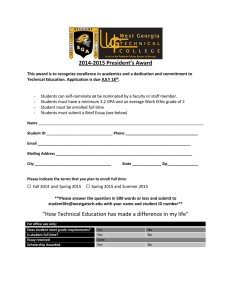Personal Statement Guide: Scholarship & Fellowship Apps
advertisement

How To Write A Personal Statement for a Scholarship, Fellowship or Award Application The personal statement is the most important component of a scholarship, fellowship or award application. As a result, plan to put a significant amount of time and effort into fine-tuning your statement. The information in this guide will assist you in learning the basic strategies for creating a piece of expository writing which is compelling, informative, and professional. Getting Started Carefully read the instructions prior to drafting your statement. Some organizations allow for significant flexibility in content and layout, while others provide defined criteria. Follow all directions closely and address the posed question/issue throughout the essay. There is no set template for a successful personal statement, but there are general guidelines to follow. Many funding organizations provide award-specific guidance for crafting a sound personal essay. Review the agency’s website to find resources such as sample statements. Invaluable information may exist regarding the criteria on which your essay will be evaluated. Use all of the resources that are available to you! Before you begin writing, think about exactly what you want to write about and why. Research the purpose of the award you are applying for and take inventory of your personal qualifications and the strengths of your candidacy. Keep in mind that the statement should demonstrate that you have thought seriously about the skills you have gained and what you have learned about yourself through your academic and life experiences. You should also think about what you hope to learn and experience in the future. Content Please take note of the nature of the award statement and what the funding organization expects from the essay. Some statements must be academically-based, while others ask that you provide a sense of who you are as an individual and the issues that are important to you. In both cases, aim to make yourself stand out as both a unique and well-qualified applicant. Recommended topics: • Highlight your most relevant experience(s) in relation to award criteria, demonstrating how they have shaped you into the strong candidate you are today. Example-for an academic-based scholarship, focus on your scholarly achievements. • Explain the history of your interests and aspirations and articulate how they are related to the award objectives. • Describe significant obstacles you have you overcome, showing unwavering commitment to your goals in spite of these challenges. Be positive; do not look for sympathy. • Mention your skills and abilities and how you have obtained them. Be careful not to provide a ‘laundry list’ of activities. • Predict your future success. Demonstrate to the funding organization that you will follow through with your ambitions and the steps you plan to take to do so. General Recommendations: • Make the statement specific to the opportunity you are applying for. Customize content to reflect the goals of the funding organization. • Use the essay to tie all of your application materials together. But, do not replicate the information provided on your resume. • Be honest and sincere. In most cases, you are writing for experts in your field; do not try to fool or second-guess your readers by misrepresenting yourself. • Draw the readers in with an engaging opening paragraph. • Allow your personality to come through. Creatively tell a story about what makes you, you. • Consider incorporating a theme into your statement to provide focus. • Include keywords and terms that are referred to in the statement question. • Use up-to-date information when referring to national and international issues or events. • Limit your use of the word “I”. • Don’t use jargon or abbreviations. Presentation The presentation of the personal statement is just as important as content. Write the essay in a clear and straightforward manner, demonstrating that you are a serious and thoughtful candidate. Your statement should be easy to read and include a clear beginning, middle and end. Correctness and style will be taken into consideration by the review committee, so be sure to carefully proofread your final copy and ask a friend to do the same. Do not exceed the word limit under any circumstances. Finishing Touches After writing the first draft, seek constructive feedback from professionals and peers, if permitted. Check the organization’s website to ensure that you are allowed to obtain assistance with this component of your application. Refine the draft and repeat this process until the statement accurately represents your accomplishments and your goals. Helpful Resources Offices Guides/Publications -Fulbright Program Personal Statement http://www.fulbright.org.uk/study-in-the-usa/postgraduate-study/applying/personal-statement -Gates-Cambridge Scholarship Personal Statement http://www.gatescambridge.org/apply/personal-statement.asp -Harry S. Truman Scholarship Foundation “Tips for Writing an Effective Personal Statement” http://www.truman.gov/effective-personal-statement -“Write Your Way Into the Graduate School of Your Choice” by Donald Asher -“Writing a Personal Statement”: Center for Career and Professional Development Quick Reference Guide http://www.binghamton.edu/ccpd/quick-reference-guides/Writing-personal-statement.pdf Office of External Scholarships, Fellowships and Awards UU 260 binghamton.edu/scholarships Janice McDonald jmcdona@binghamton.edu; Ashley Serbonich aserboni@binghamton.edu
![Bourse Loran Scholarship [formerly the CMSF National Award]](http://s3.studylib.net/store/data/008459991_1-b0aaf3db7ad79ae266d77380f9da023a-300x300.png)


